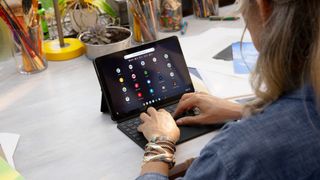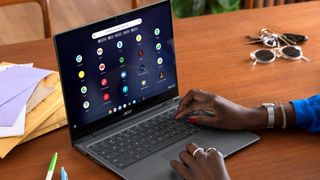Here’s why Chromebooks are the perfect all-rounder laptops for university students

Chromebooks are rapidly becoming more and more popular, and it’s easy to see why. They offer a raft of benefits at a range of prices, making them a go-to choice these days as the perfect laptops for university students.
Indeed, in recent times we've seen record-breaking sales for Chromebooks in the education arena; and with a range that includes everything from lightweight £200 Chromebooks to high-performance £500+ devices, there's a Chromebook for every student.
All Chromebooks are seriously speedy by design, by the very nature of their operating system – we’ll come back to that point shortly. Higher spec Chromebooks, like the Pixelbook Go or the HP Chromebook X360, are great for fast multi-tasking and media editing, thanks to their large storage and powerful processors.
Let’s take a deeper dive into exactly how much Chromebooks have come on in modern times, particularly for university students who, due to continued pandemic-related disruption, are facing another year – or a first year – of ‘blended’ learning, a combination of traditional and remote studying.
The latter requires a sufficiently versatile and powerful laptop, and as you’ll see, broadly speaking, Chromebooks are a perfect fit for the kind of flexibility required, with compelling options at both the more affordable and more premium ends of the pricing spectrum.
Advantage Chromebook
What’s so good about Chromebooks when it comes to students, then? For starters, these machines offer great performance levels.
That’s because Chrome OS, Google’s operating system that’s installed on a Chromebook, is built specifically from the ground-up to be really lightweight and fast, and to boot up very quickly too (so when you open your laptop in the lecture hall, you’ll be ready to take notes almost straightaway). In short, performance is an all-round strong suit, and that’s obviously a major draw.
Not only are these speedy laptops in general, but getting up and running with a Chromebook is an equally snappy experience.

From opening the notebook for the very first time, all you need to do is sign into your Google Account, and your Chrome browser preferences (plus your files stored in Google Drive, which is Google’s cloud storage locker) will instantly be available on the device.
Initially, you’re also offered a guided tour of the operating system, although in any case, Chrome OS is very intuitive to use and easy to navigate in general.
Handy touches like the Everything Button, the key that now offers even more shortcut functions, add new levels of convenience for swiftly finding whatever you need on a Chromebook.
Furthermore, automatic software updates are another distinct boon in terms of usability, happening seamlessly in the background without ever interrupting your studies. (Chromebooks also have a ‘Do not disturb’ mode to turn off any notifications so you can concentrate fully on your work with no distractions, too).
Productivity and beyond
Speaking of studies, productivity is obviously a key concern for any student, and if you’re worried about not being able to run powerhouse software like Microsoft Office apps, don’t be. The web versions of Microsoft Word, Excel, and PowerPoint work just fine in the browser.
Google’s own suite of office applications – Docs, Sheets, and Slides – is also on hand, naturally, if you prefer those alternatives.

Remember, you don’t have to be online to work on these web apps – you can continue to work offline on documents or spreadsheets, and then once you get back on Wi-Fi, whatever you’ve done will be automatically synced up on Google Drive.
The same goes for games, or TV shows, which can be downloaded to local storage and played offline. Using a laptop isn’t all about work, of course, and on the entertainment front, Chromebooks allow access to games from Google Play, and a whole load of other apps from the store, including Disney+ and Netflix for streaming content.
Battery benefits
Does talk of watching videos prompt concerns about battery life? Well, don’t be worried on that score, because Chromebooks offer good battery longevity in general, with a typical claimed life of up to 12 hours (though naturally this does depend on the exact model of laptop, and type of usage it’s undergoing).
Broadly speaking, though, these portables offer plenty of staying power to get you through a day of studying, or an evening of relaxing.
Safe and secure
Security is another important consideration, and much like Chromebooks were designed from scratch with high-performance in mind, Chrome OS by its very nature is highly secure, sandboxing running apps away from the rest of the system (to keep anything malicious contained).
The automatic and seamless system updates we’ve already mentioned help here, too, in keeping security technology fully up-to-date without the user having to think about it or do anything.
All this means that you don’t need to worry about your university coursework, or indeed other precious personal data, being compromised or somehow exploited.
Supreme synergy

Further nifty features offered by Chromebooks include a good deal of synergy with other Google devices. For example, if you have a Chromecast-toting TV, you can easily cast a Chrome browser tab to it directly from your Chromebook.
For those with an Android smartphone, there’s the Phone Hub feature which allows for reading and responding to texts directly from the laptop, or checking the handset’s battery life, or indeed locating your phone.
Content you’ve been browsing in the Chrome browser on your mobile can also be pulled over to the Chromebook for convenience.
Other advantages of hooking up a Chromebook and Android smartphone together include the ability to use Nearby Share to wirelessly share files between the two devices with ease, and should your Wi-Fi go down, Instant Tethering allows the laptop to use the phone’s cellular connection to stay online using mobile data.
And finally, a smart extra security feature is the ability to use your Android phone to unlock your Chromebook, so when your smartphone is nearby and unlocked, your laptop will follow suit automatically.
The Chromebook for you
So, are you sold on a Chrome OS-powered laptop yet? In that case, check out the full and extensive range of Chromebooks at John Lewis, which encompasses notebooks from major manufacturers like Acer, Asus, HP, Lenovo, and Google itself.
A diverse selection of models is available, including traditional clamshell laptop form-factors, and 2-in-1 convertible Chromebooks that can be used as tablets too (either thanks to a 360-degree hinge, or a detachable keyboard).
Look out for the chunky discounts that John Lewis offers with some models on a regular basis – it’s not unusual to make savings of £100 (or more).
On top of that, to stack up the value proposition further, don’t forget that Chromebooks come with a bunch of freebies, or perks as Google calls them.
Find the full list of perks here, but the highlights currently include three months of free access to YouTube Premium (which has no ads) plus YouTube Music Premium.
And similarly, there’s a free three-month subscription to Stadia Pro to allow for the streaming of all kinds of top-quality games to your Chromebook (like PUBG or Destiny 2).
Finally, 100GB of cloud storage is up for grabs on Google One, with a free subscription for a whole year in this case. That gives you plenty of space for your coursework documents, and media like the snaps from your phone too.
Creative types will also be interested to learn of three-month freebie offers on apps such as KineMaster Premium (video editor), Canva Pro (graphic design) and more.
Get daily insight, inspiration and deals in your inbox
Sign up for breaking news, reviews, opinion, top tech deals, and more.
